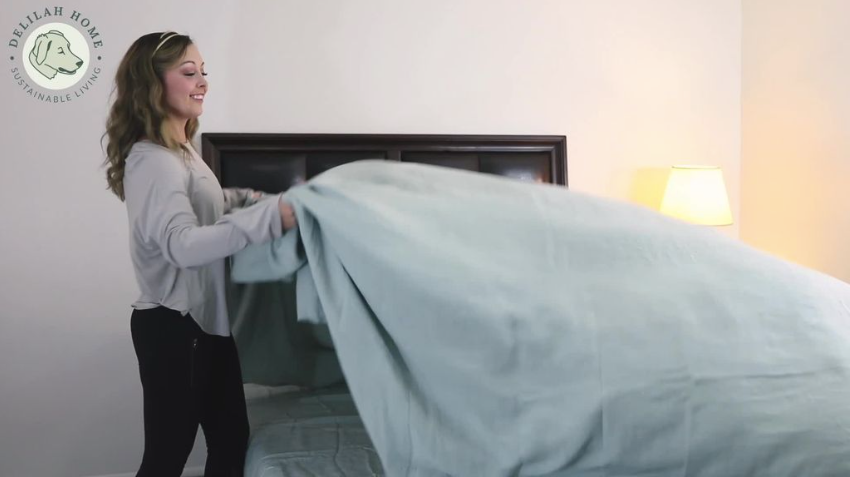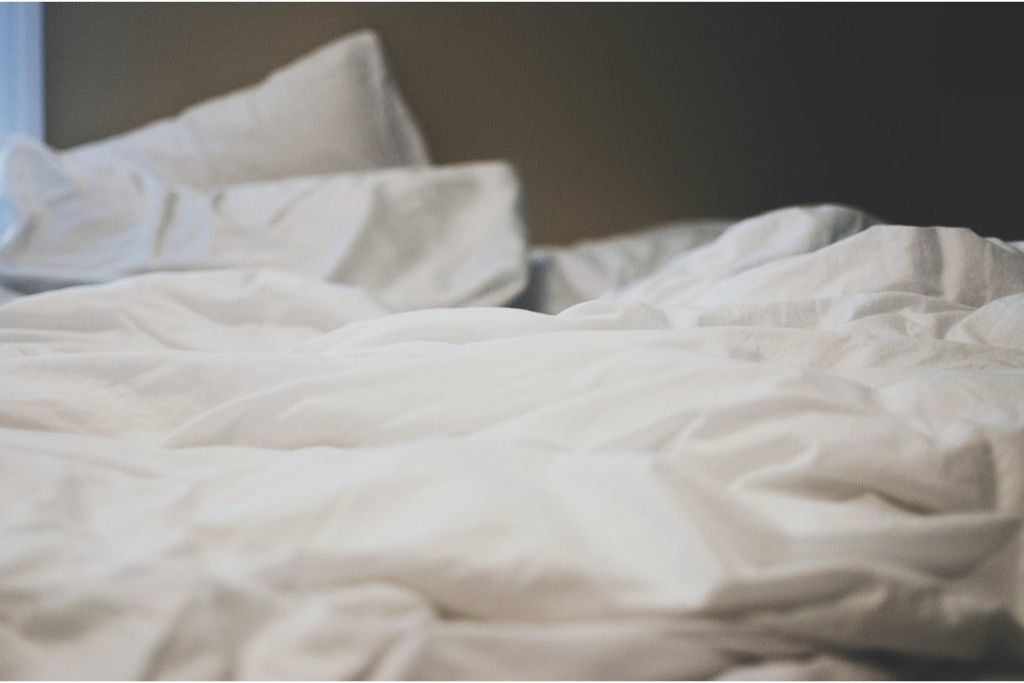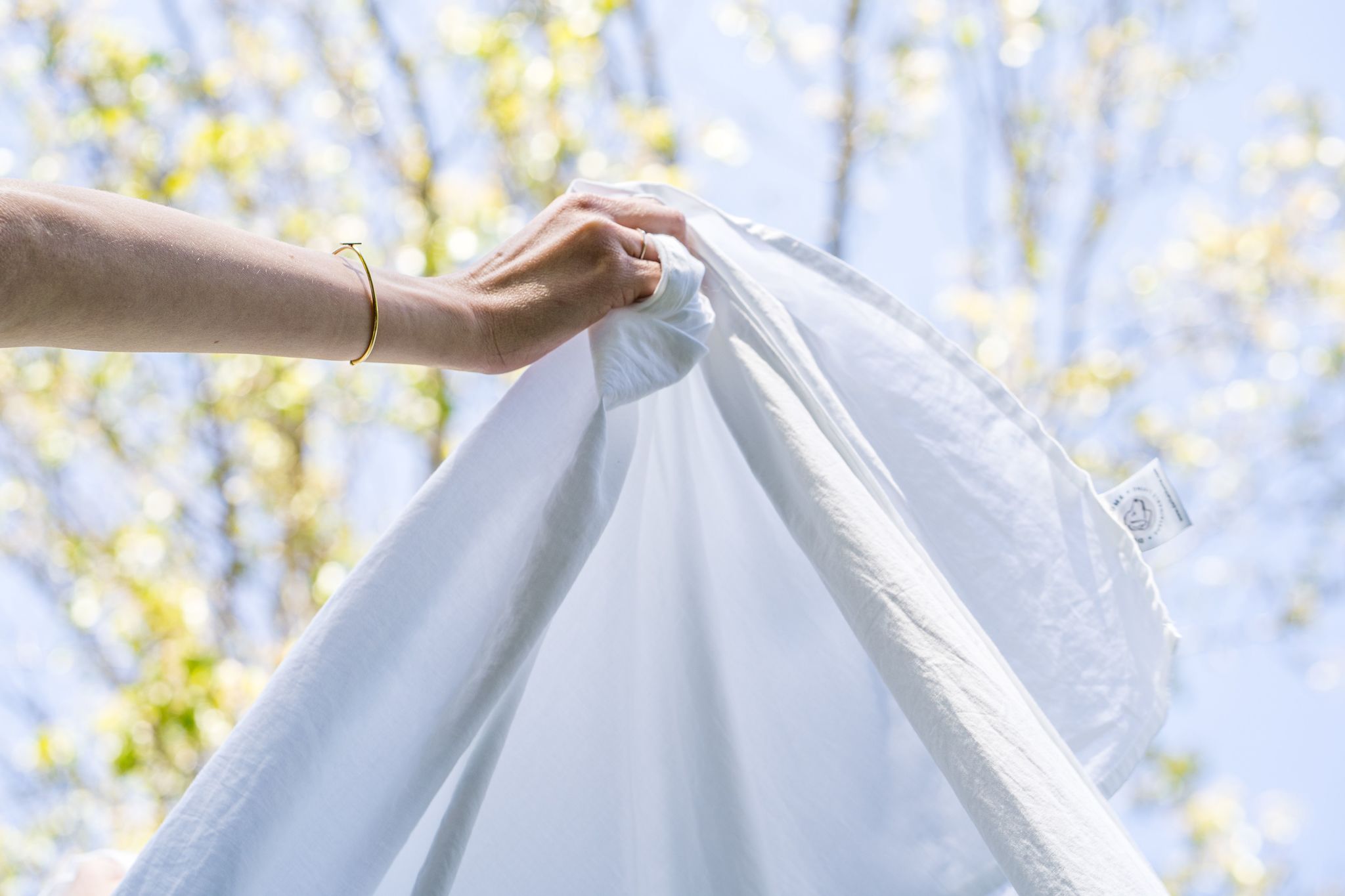Welcome to our blog on how to make your sheets super soft without toxic chemicals! We spend a significant portion of our lives sleeping, and the quality of our sleep can greatly affect our overall well-being.
Soft, cozy, and comfortable sheets can make a huge difference in the quality of our sleep. But many of the commercial fabric softeners and detergents promise to make our linens soft and fragrant by washing linen sheets that contain harsh chemicals that can harm our health and the environment.
Fortunately, there are plenty of natural and non-toxic ways to achieve that luxurious, soft feeling on your sheets without compromising your health or the environment.
In this blog, we will explore some of the best tips and tricks to make your sheets feel like they came straight out of a fancy hotel room, all while avoiding harsh chemicals and synthetic fragrances. So, you won't have to ask yourself, 'Why do my new sheets feel like sandpaper?'.
From using natural fabric softeners to simple laundry hacks, we'll show you how to transform your sheets into a cozy and inviting haven for a restful night's sleep. So let's dive in!
Why do your sheets get rough and scratchy?

Sheets can become scratchy and rough over time, especially top sheets, if not taken care of properly because of the accumulation of dirt, oil, and sweat.
When we sleep, our bodies produce oils and sweat that can get trapped in the fibers of the sheets. Over time, these substances can build up and cause the sheets to become stiff, scratchy, and uncomfortable to sleep on.
In addition to this, washing and drying the sheets improperly can also contribute to their scratchiness.
Using too much detergent or fabric softener, washing with hot water, and drying at high temperatures can all damage the fibers of the sheets, making them rough and less comfortable.
Moreover, using certain types of fabric softeners or detergents can also cause irritation and allergic reactions on sensitive skin.
Many commercial fabric softeners contain harsh chemicals and synthetic fragrances that can cause skin irritation, respiratory problems, and other health issues.
Now you may be wondering, How do I make my sheets softer? Don't worry, we have you covered.
Important Techniques for Super Soft Sheets

If you're looking to make your bed sheets and top sheets super soft without using toxic chemicals, there are several natural and non-toxic methods that you can use to achieve that luxurious feel.
Here are some tips on how to soften scratchy sheets without compromising your health or the environment:
-
Choose natural and gentle laundry detergent: One of the most important steps to make your bed sheets soft is to use a natural and gentle laundry detergent. Many commercial laundry detergents contain harsh chemicals that can damage the fibers of your sheets and make them scratchy over time. Look for natural and eco-friendly detergents free from synthetic fragrances, artificial dyes, and other harmful chemicals.
-
Use less detergent and fabric softener: While it may be tempting to use a lot of detergents and fabric softener to make your sheets smell good and feel soft, overusing these products can make your sheets rougher. Too much detergent or fabric softener can leave behind a residue that can build up over time, causing the sheets to become stiff and scratchy. Instead, use only the recommended amount of detergent and fabric softener, or consider skipping the fabric softener altogether.
-
Add vinegar or baking soda to the wash cycle: Adding a cup of white vinegar or a half cup of baking soda to the wash cycle can help soften your sheets and make them feel more comfortable. Vinegar and baking soda are natural fabric softeners that can help break down any residue left behind by detergent or fabric softener. They can also help remove any odors or stains from your sheets. Wash your sheets in cold water: Washing your sheets in cold water can help preserve the fibers of the fabric and prevent them from becoming damaged or rough. Hot water can cause the fibers to shrink or become misshapen, making the sheets less soft and comfortable to sleep on.
-
Dry your sheets on a low-heat setting or hang them to dry: Drying your sheets on a high-heat setting can cause the fibers to break down and become damaged, which can make them tougher over time. Instead, use a gentle, low-heat setting to dry your sheets or hang them to dry. Hanging your sheets to dry can help preserve the softness of the fabric and prevent any damage from the heat of the dryer.
- Use wool dryer balls: If you prefer to use a dryer, consider using wool dryer balls instead of fabric softener sheets. Wool dryer balls are a natural and eco-friendly alternative to fabric softener that can help reduce drying time and soften your sheets without the use of chemicals.
-
Consider using a fabric conditioner: If you're looking for an extra boost of softness, consider using a natural fabric conditioner made from ingredients like essential oils and plant extracts. Fabric conditioners can help make your sheets feel even softer and more luxurious, but make sure to choose a natural and non-toxic option.
-
Avoid bleach: Bleach is a harsh chemical that can damage the fibers of your sheets and cause them to become rough and scratchy. Instead of using bleach to whiten your sheets, consider using natural alternatives like baking soda, lemon juice, or hydrogen peroxide.
- Choose high-quality sheets: The quality of your sheets can also play a role in how soft and comfortable they feel. Look for high-quality bed sheets made from natural fibers like cotton sheets, or hemp bed sheets. These materials are a bedroom essential as they are breathable, soft, and durable and can help keep you cool and comfortable while you sleep.
-
Try a natural fabric softener spray: Another way to make your sheets super soft without toxic chemicals is to use a natural fabric softener spray. This can be made by combining distilled water, a natural fabric softener like white vinegar or essential oils, and a small amount of rubbing alcohol. Simply spray the mixture onto your sheets before bedtime and allow them to dry. This can help refresh your sheets and make them feel softer and more comfortable.
-
Pre-treat stains naturally: If your sheets have stains, it's important to pre-treat them before washing. Instead of using harsh stain removers, try natural alternatives like lemon juice or baking soda. Simply apply the natural pre-treatment to the stain, let it sit for a few minutes, and then wash as usual. This can help remove stains without damaging the fibers of your sheets.
- Use a gentle ironing technique: If you like the look of freshly ironed sheets, use a gentle ironing technique to avoid damaging the fibers of your sheets. Use a low heat setting and iron your sheets while they're slightly damp. This can help smooth out any wrinkles and creases and make your sheets feel softer and more comfortable and it is a bedroom essential.
-
Store your sheets properly: Properly storing your sheets can also help keep them soft and comfortable. Make sure to fold your sheets neatly and store them in a cool, dry place. Avoid packing them too tightly or exposing them to direct sunlight or heat sources, as this can cause the fibers to break down and become rough.
-
Consider natural remedies for allergies: If you have allergies, it's important to choose natural and non-toxic products for your bedding. Consider using natural remedies like essential oils or eucalyptus leaves to help alleviate allergy symptoms with a eucalyptus bedsheet. You can also choose bedding made from natural fibers like bamboo or organic cotton bed sheets or organic hemp bed sheets, which are less likely to trigger allergies.
- Take care of your sheets: Lastly, taking good care of your sheets can help them stay soft and comfortable for longer. Make sure to wash your sheets regularly, ideally once a week, and avoid leaving them in the washer for too long after the cycle has ended. Store your sheets in a cool and dry place, and avoid exposing them to direct sunlight or heat sources.
Making your bed sheets super soft without toxic chemicals is easy and affordable. By using natural and eco-friendly laundry detergents, washing your sheets in cold water, and avoiding overuse of fabric softener, you can help keep your sheets soft and comfortable.
Additionally, adding vinegar or baking soda to the wash cycle, drying your sheets on a low-heat setting, and using wool dryer balls can all contribute to making your sheets feel like a dreamy cloud to sleep on.
How Often Should You Wash Your Sheets?

It's recommended that you wash your sheets once a week to maintain good hygiene and prevent the buildup of sweat, dirt, and oils.
However, the frequency of washing your sheets may depend on several factors, such as your personal preferences, the climate you live in, and your sleeping habits. If you tend to sweat a lot or have allergies, you may need to wash your sheets more frequently, such as every three to four days.
Similarly, if you live in a humid or dusty environment, you may need to wash your sheets more frequently to prevent the buildup of dust mites and other allergens. On the other hand, if you live in a cool and dry climate and don't sweat much, you may be able to wash your sheets every two weeks without compromising hygiene or comfort.
In addition to the frequency of washing, it's also essential to use the proper washing and drying techniques to maintain the softness and quality of your sheets.
Using natural and non-toxic detergents, avoiding high heat drying, and using natural fabric softeners can help prolong the lifespan of your sheets while keeping them clean and comfortable.
You may now be thinking, "How often should you wash quilts and pillows?" We have you covered.
How often should you wash quilt covers (duvet covers) and pillows?
Similar to bedsheets, the frequency of washing quilt covers (duvet covers) may depend on personal preferences and other factors. However, it's generally recommended to wash quilt covers every two to four weeks or when they become visibly dirty or stained.
When it comes to quilts and pillows, it's recommended to wash them every three to six months.
However, this may also depend on how you like your pillows/quilts and the climate you live in. If you sweat a lot or have allergies, it is recommended that you wash your quilts and pillows more frequently, such as every two to three months.
Similarly, if you live in a humid or dusty environment, you may need to wash your quilts and pillows monthly to prevent the buildup of any type of dust mites and other allergens.
It's also important to follow the care instructions provided by the manufacturer when washing quilts and pillows. For example, some quilts and pillows may require special care, such as dry cleaning or air-drying, to prevent damage or shrinkage.
Do Seasons Matter?
Yes, the seasons can affect the frequency of washing your bedding. In general, you may need to wash your bedding more frequently during the warmer months when you tend to sweat more and shed more dead skin cells.
During the summer months, you may need to wash your sheets and quilt covers much more routinely, such as every week or every two weeks. This can help prevent the buildup of dead skin, sweat, and bacteria, which can cause odours and skin irritation.
During the colder months, you may be able to wash your bedding less frequently, such as every two weeks to a month. However, this may depend on personal preferences and the weather you experience.
If you tend to sweat a lot or have allergies, it is recommended you wash your bedding more often during the colder months.
Regardless of the season, it's important to use the proper washing and drying methods to maintain the quality and comfort of your bedding. Using natural and non-toxic detergents, avoiding high heat drying, and using natural fabric softeners can help prolong the lifespan of your bedding while keeping them clean and comfortable.
Conclusion
Having soft and comfortable bed sheets can make a significant difference in the quality of your sleep. Scratchy and rough sheets can make it hard to fall asleep and can cause discomfort during the night.
However, using toxic chemicals to soften your sheets can have adverse effects on your health and the environment. By adopting natural and non-toxic methods to soften your sheets, you can improve the quality of your sleep while also protecting your health and the environment.
In addition to the methods mentioned above, you can also consider investing in high-quality bedding made from natural materials like bamboo, cotton, linen or even satin bed sheet.
These are the best materials for bed sheets that are naturally soft and breathable, making them ideal for a comfortable night's sleep.
Moreover, they are durable and can withstand frequent washing and drying without losing their softness and comfort. It's also essential to maintain good bedding hygiene and wash your sheets regularly to avoid the buildup of bacteria, dust mites, and allergens.
This can help improve the quality of your sleep and prevent skin irritation and allergies. Overall, making your bed sheets super soft without toxic chemicals is not only possible but also beneficial for your health and the environment.
By adopting natural and eco-friendly methods and taking good care of your bedding, you can create a comfortable and inviting sleep environment that promotes restful and rejuvenating sleep.




Leave a comment
This site is protected by hCaptcha and the hCaptcha Privacy Policy and Terms of Service apply.